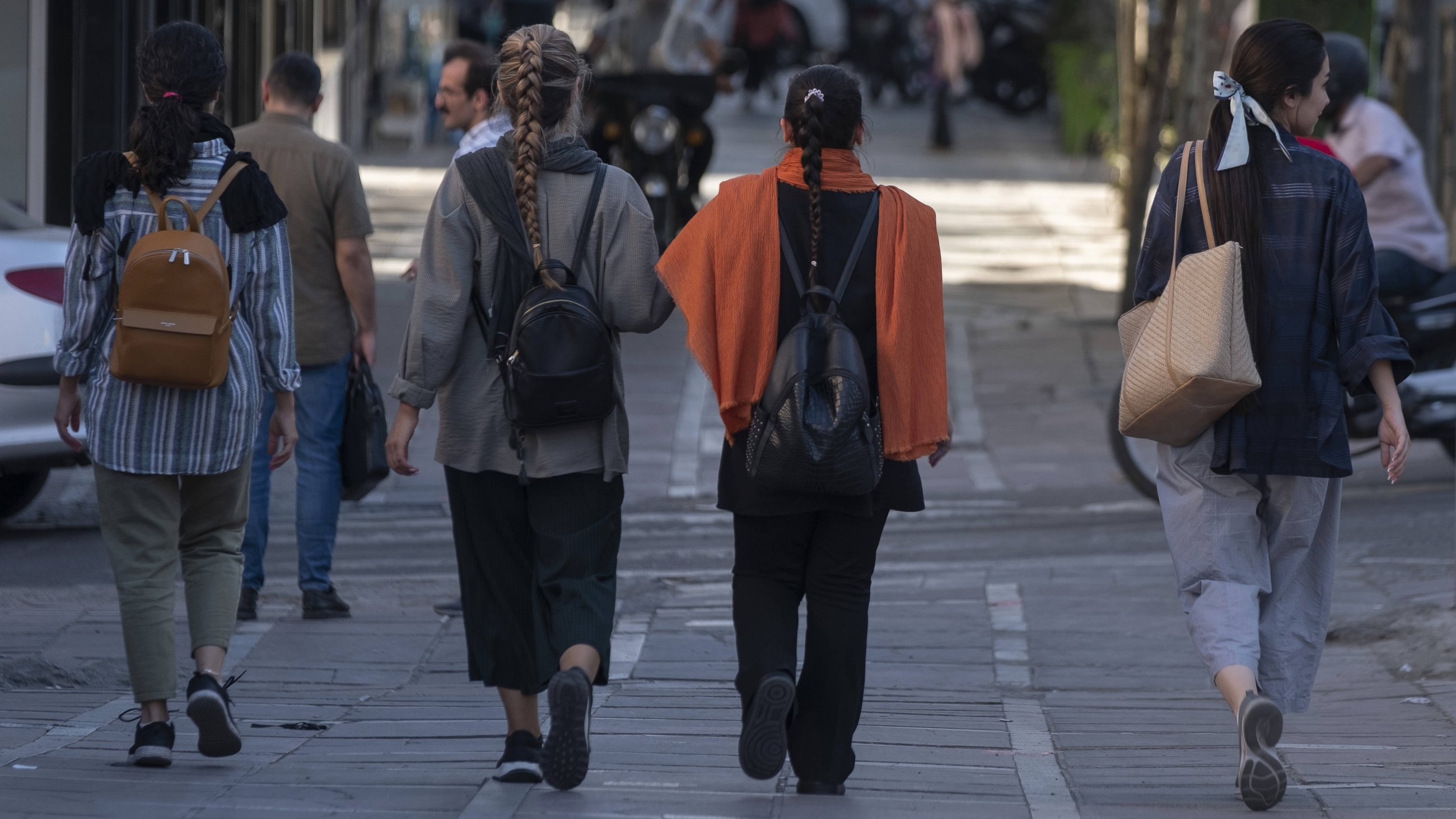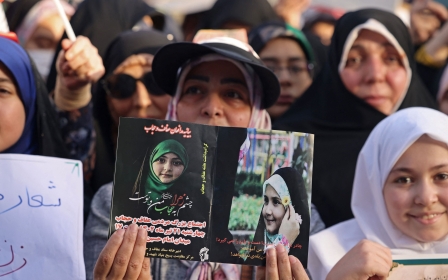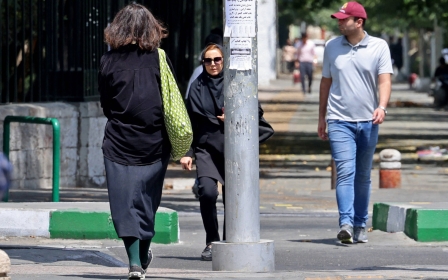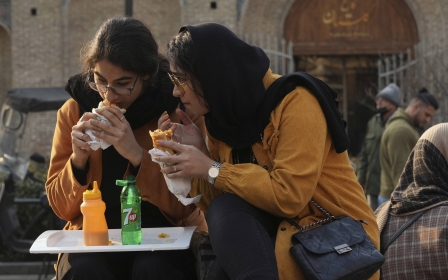Iran bets on brutal new hijab law after a year of failing to suppress women

As the first anniversary of the death of Mahsa Amini in police custody approaches, Iranian authorities are pushing through the process of passing a controversial hijab law, after other initiatives to force women to wear headscarves in public, including the use of AI cameras, have seemingly failed.
Over the past year, months after security forces violently put an end to weeks of protests ignited by Amini's death, Iranian women have increasingly flouted the mandatory dress code, leading to growing scrutiny, intimidation and grave attempts by Iranian authorities to control the situation.
In March, notorious police force commander Ahmad Reza Radan, appointed in January, announced the installation of "smart tools and cameras" to identify women not complying with the hijab and warning them 0f legal consequences.
A month later, police began monitoring traffic cameras to locate women not complying with the law, as part of their implementation of a so-called "national chastity and hijab plan".
Those who are caught for the first time are sent a "warning text message as to the consequences" of their actions. On the second offence, their vehicles would be confiscated and they would face a lawsuit.
Stay informed with MEE's newsletters
Sign up to get the latest alerts, insights and analysis, starting with Turkey Unpacked
Mahmoud Javad Azari Jahormi, a former communications minister, has raised doubts about the effectiveness of the surveillance plan, predicting weaknesses in such a system would eventually start to appear. He further cautioned that the system could become less effective over time.
“Currently, China is considered a leading country in the field of facial recognition cameras. In China, contrary to developed countries, privacy laws are weaker and the government has been allowed to implement this technology on a large scale," an expert in artificial intelligence technology told Middle East Eye on condition of anonymity.
"But in terms of infrastructure, we are so far away from China to be able to implement such technologies. Therefore, what the Islamic Republic has is a limited capability and, as you can see, it has failed because had they been able to succeed, they wouldn’t bring the morality police back to the streets."
Following Amini's death, the morality police came under scrutiny and suspended its street patrols. In July, however, and to the dismay and shock of many Iranians, the force resumed car and foot patrols across the country to deal with individuals wearing what is deemed as "unusual clothing".
"This shows that their plan has fully failed,” the expert said.
Fines, dismissal and prison
The draft law introduces a range of punitive measures for the various violations it delineates.
Both men and women, found wearing "indecent attire" in the street face fines categorised as the "sixth degree" for initial offences, followed by the "fifth degree" for subsequent transgressions.
In simpler terms, this translates to fines ranging from six to 24 million tomans ($100 to $500) for first-time offenders, and 24 to 50 million tomans ($500 to $1,000) for second to fourth offences.
Subsequent violations could carry a fine of 50 to 100 million tomans ($1,000 to $2,000).
The legislation further specifies that "indecent attire" for women includes wearing short-sleeved clothing, round-neck t-shirts, three-quarter length trousers, and ripped trousers. Men, meanwhile, are not allowed to wear low-waist trousers.
The Judicial Commission of the Parliament has ruled that donning an improper outfit is punishable by substantial fines that could reach 280 million tomans ($6,000) for repeat offenders, potential arrest, and a prison sentence ranging from five to 10 years.
Remarkably, the bill empowers citizens to apprehend offenders in the absence of law enforcement personnel, as well as reporting on people not adhering to the law.
Furthermore, public employees, including teachers, who fail to wear the hijab in the workplace face penalties akin to those applied for public non-compliance, in addition to potential dismissal from government and public services between six months to two years.
The legislation also stipulates that providing services to individuals not wearing the hijab or not adhering to the dress code in tourism-related places would lead to the termination of employment. The person punished also risks being banned from working again in the same field for up to two years.
On university campuses, meanwhile, “inappropriate attire” will be first addressed through the university's own disciplinary regulations. However, subsequent violations will be referred to the police for sanctions consistent with public indecency.
'That says a woman is so dangerous that ordinary people and passers-by must do something until the police arrive. This is ridiculous'
- Lawyer
The publication of images featuring unveiled women on social media will also be met with fines ranging from six to 24 million tomans ($100 to $500).
Certain penalties meanwhile target businesses directly, with those found to be providing services to women in "improper" attire risking closure and other serious consequences.
Allowing voluntary hijab among employees also carries monetary and social exclusion consequences for businesses and staff.
People who buy goods or services online from a business that promotes illegal attire risk paying a fine three to four times the amount of the item purchased.
Likewise, celebrities promoting voluntary hijab and "indecency" on social media, or engaging in organised production, distribution or importation of "indecent" clothing, will incur financial penalties, typically based on the income derived from such activities.
The law also imposes financial penalties on foreign residents who fail to wear the hijab, which could lead to expulsion from the country.
Judged harsher than drug traffickers
Objections to the hijab law, which authorities are doing their best to pass in the coming weeks, have led to vigorous debates among legal experts, sparking discussions that shed light on the intricacies of this legislation.
Speaking to MEE on condition of anonymity, a former judge cynically characterised it as a "legislative marvel", one that reveals the pitfalls of haste, lack of planning, and overall incompetence on the part of its authors.
A seasoned lawyer, also speaking on condition of anonymity, meanwhile, drew a stark comparison between the harsh consequences of not adhering to the hijab law and the penalties imposed on perpetrators of other offences.
For instance, producing five kilograms of crack cocaine leads to a fine of five to 20 million tomans ($100 and $400) and a prison sentence of up to 15 years.
“Compare this punishment with a woman who does not wear a hijab. Not only can she be fined up to 280 million tomans according to this law, but in addition to the police force, people can also arrest and detain her immediately," said the lawyer.
"That says that a woman is so dangerous that ordinary people and passers-by must do something until the police arrive. This is ridiculous.”
'Children not immune'
An additional contentious aspect of the bill pertains to penalties for those under 18 years of age.
During a parliamentary session last month, Gholamreza Nouri Qazalcheh voiced concerns that even students are at risk of detainment.
'Look at the details of the hijab law. It is shocking to see that even children are not immune from brutal and merciless laws'
- Journalist
“When a 10-year-old student acts against this law, the parents who sent their child to school in the morning must pick him up from the police station at night,” said Qazalcheh.
Meanwhile, Hossein Jalali, a member of the parliament's Cultural Commission, endorsed fines for minors, emphasising that individuals under 18 enjoy various privileges and responsibilities, including access to education, employment, and banking services.
Violating the hijab law will result in the suspension of these privileges and financial penalties, confirmed Jalali.
“We are approaching dangerous levels. I'm really scared of the hardliners that are ruling the country. It is like the Taliban is ruling the country. There is no difference," a reformist journalist, who didn’t want his name to be revealed, told MEE.
"Look at the details of the hijab law. It is shocking to see that even children are not immune in this country from brutal and merciless laws.”
This article is available in French on Middle East Eye French edition.
Middle East Eye delivers independent and unrivalled coverage and analysis of the Middle East, North Africa and beyond. To learn more about republishing this content and the associated fees, please fill out this form. More about MEE can be found here.





